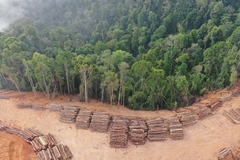
- Industry news
Industry news
- Category news
Category news
- Reports
- Key trends
- Multimedia
- Journal
- Events
- Suppliers
- Home
- Industry news
Industry news
- Category news
Category news
- Reports
- Key trends
- Multimedia
- Events
- Suppliers
“Unprecedented deregulation?” EU member states push for third EUDR delay
Key takeaways
- The Danish EU Council Presidency proposes extending EUDR compliance deadlines to December 2026 for large companies and June 2027 for small enterprises.
- The proposal marks the third postponement of the regulation, shifting from the EU Commission’s earlier stance that kept December 2025 deadlines for larger firms.
- Environmental groups criticized the proposed delays, while some businesses welcomed extra preparation time.

The EU Deforestation Regulation (EUDR) faces its third major postponement, with a draft negotiation document from the Danish EU Council Presidency proposing to push the main compliance deadline for large and medium companies from December 30, 2025, to December 30, 2026. Small and micro enterprises would have until June 30, 2027, to comply under the proposal, which has garnered support from a majority of member states.
The latest delay marks a significant shift from the European Commission’s (EC) earlier stance. In October, EU Commissioner for Environment Jessika Roswall proposed postponing enforcement until the end of 2026, citing “serious IT capacity concerns” that could prevent the compliance system from operating at scale. However, that proposal suggested keeping the December 2025 deadline for larger firms while delaying penalties by six months.
The EC’s October proposal also recommended exempting downstream operators and traders from submitting due diligence statements — a move that drew criticism from environmental groups. Isabel Fernandez, senior consultant at Mighty Earth, warned at the time that this exemption would create a major blind spot in the EUDR framework, making it difficult for member state agencies to track down non-compliant products already circulating on the EU market.
The current November draft, driven by member state and industry pressure, goes further by seeking a comprehensive delay for all businesses to address concerns about legal certainty and operational readiness. The proposal is now under negotiation between the European Parliament and Council, with a final decision expected by mid-December 2025.
“Deregulation agenda”
Environmental organizations sharply criticized the repeated proposals to delay implementation, which is now almost a year past the original target date of December 2024.
Anke Schulmeister-Oldenhove, forest policy manager at the WWF European Policy Office, said the move came as the EC pursued an “unprecedented deregulation agenda,” describing it as an “embarrassment” for EC President Von der Leyen. Schulmeister-Oldenhove argued that the technical issues revealed both incompetence and a clear lack of political will to invest sufficiently in timely implementation.
ClientEarth lawyer Michael Rice called it “ludicrous” that the administration of the world's biggest single market could not handle the data requirements, accusing the commission of using its own inadequate IT system as an excuse to delay the world’s most important forest law for a second time in 12 months.
Some businesses welcomed additional preparation time. Mondelēz formally requested a 12-month delay in July, citing volatile cocoa prices, infrastructure gaps, and pressures on smallholder farmers. The Indonesian Palm Oil Association consistently asked that the sustainable development needs of smallholders be recognized as part of the regulation.
However, Mighty Earth stressed that further delays would massively disadvantage companies and countries that had prepared for the expected December implementation, adding that it ignored the will of EU citizens who don’t want to buy products tied to deforestation.
The EUDR, which requires businesses to provide due diligence statements supported by geolocation data showing products have not come from land deforested after 2020, was originally intended to come into force in December 2024. The regulation impacts various food and beverage supply chains, including cocoa, soybeans, coffee, palm oil, and beef.











